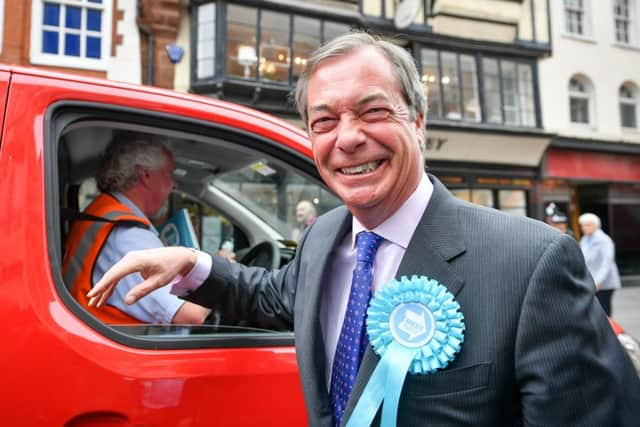European election result offers no mandate for no-deal Brexit or second referendum - The Yorkshire Post says


After his success with Ukip in the 2014 European elections which played a key role in setting the UK on the path to the 2016 Brexit referendum, his newly-formed Brexit Party has repeated the trick once again by winning the 2019 vote by a substantial margin. In Yorkshire and Humber The Brexit Party won in every local authority area, bar York.
Even accepting that Farage’s new entity essentially cannibalised the previous Ukip vote, who lost all of their 24 MEPs, the results are a stunning achievement and another shock to traditional party politics.
Advertisement
Hide AdAdvertisement
Hide AdHowever, it is vital that these results are set in context, given The Brexit Party’s stated preference for a no deal departure from the European Union which experts almost uniformly agree would have grave consequences for the economy and jobs and imperil the operation of the already-stretched NHS.
The Brexit Party took around 32 per cent of the overall vote share, with unambigiously pro-Remain parties such as The Liberal Democrats, the Green Party and Change UK collectively taking a higher percentage of the vote than the pro-Leave parties. This was on an overall electoral turnout of about 37 per cent – meaning six in ten eligible voters stayed at home rather than casting a ballot.
As such, this result cannot and should not be interpreted as a mandate by the British people to push ahead with a no-deal Brexit.
Equally, the result cannot either be interpreted as a collective cry from voters for a second referendum to reconsider leaving the European Union. It is clear the country is becoming more – not less – polarised on the issue of Brexit and that another vote could go either way and be unlikely to solve the divisions that have opened up.
Advertisement
Hide AdAdvertisement
Hide AdBoth Labour and the Tories were punished for their attempts to find some form of compromise on Brexit as voters flocked to those offering simpler, but more extreme, solutions of either cancelling Brexit entirely or pursuing a departure strategy on World Trade Organisation terms – which no serious voice was advocating during the 2016 campaign.
It is entirely understandable that Yorkshire Labour MPs such as Caroline Flint and Kevin Barron are urging caution on Labour backing a second referendum given the strong performance of The Brexit Party in places like Doncaster and Rotherham. But with most Labour supporters being Remain backers and Jeremy Corbyn’s tactical ambiguity being rejected by voters on both sides of the divide, the party appears like to take a more clear anti-Brexit position.
The situation presents an almost impossible bind for whoever succeeds Theresa May as Prime Minister and leader of the Conservative Party, which suffered a historically bad result, finishing in fifth place behind the Green Party.
Pursuing a no deal route may spike the guns of The Brexit Party, who intend to stand candidates at the next General Election, but would undoubtedly be viewed with horror by many voters who previously supported the Conservative Party and believed in their reputation for pragmatism and economic competence.
Advertisement
Hide AdAdvertisement
Hide AdTheresa May warned that the country would have a choice of her deal, no deal or no Brexit. With the first option essentially now ruled out, the other two – each of which would have alarming consequences for the country for different reasons – are becoming much more likely.